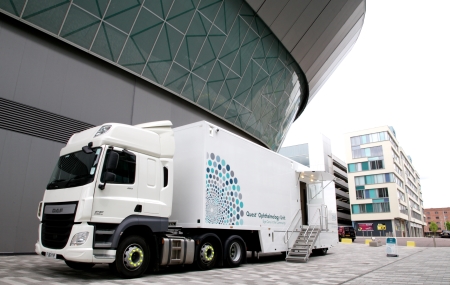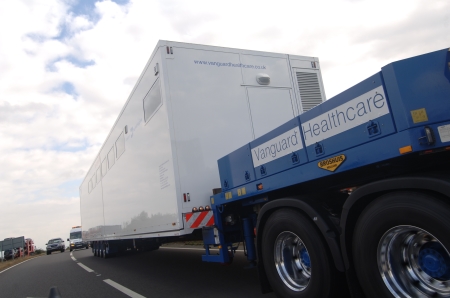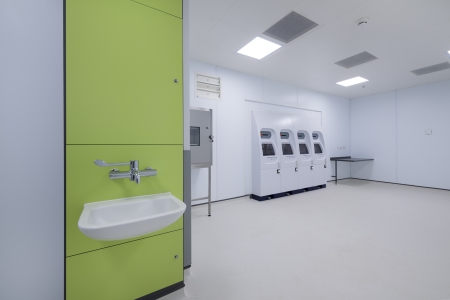Hospitals across the UK are constantly facing a battle to improve and expand services while operating with ever-dwindling budgets. This means they must use the space they have as effectively as possible and, where necessary, build additional infrastructure with next to no capital.
But the construction industry is responding to these conflicting needs with a whole host of solutions embracing off-site building methods.
As a result, modular and mobile units are being installed in hospitals up and down the country, providing additional space at a fraction of the cost of new-built facilities.
The approach is also more environmentally friendly, a key consideration for organisations charged with reducing the impact their services have on the environment.
And, as the units are fabricated and fitted out off-site, there is much less disruption to hospital estates and services while work is taking place.
Wernick Buildings has worked with a number of NHS trusts to provide modular offsite space solutions, from new wards to dialysis centres.
Among its healthcare clients, the company has helped Velindre Cancer Centre in South Wales come up with a novel way of solving the problem of a lack of back-office space, by building a modular office block to locate administration staff in one place.
This, in turn, enables the hospital to expand clinical services into the spaces left behind.
Meeting the challenge
The building features external lighting and security systems, vital for staff working out of hours; while, internally, there are conference rooms, open-plan office spaces, a disabled access lift, toilet facilities, and an ADT alarm system.
Modular construction may not be the miracle cure for all the problems facing the NHS at present, but offsite building methods can produce space quickly, and without putting excess pressure on already-stretched hospital budgets
Wernick also solved a challenge for Leicester Royal Infirmary, which needed two new inpatient wards but had taken up all usable space in existing buildings.
The resulting building consists of 80 units which make up the mainly-two-storey block, which rises up to three stories to link into the existing skywalk.
The two 28-bed wards help the hospital to meet spatial standards identified in HBN 04 and were completed from start to finish in 12 months.
Each ward consists of five bays with four beds and eight side rooms.
All bays have en-suite toilet and shower room and all side rooms have en-suite WC and shower.
Commenting on this shift in focus to offsite construction methods, Wernick contracts manager, Ben Hitchcock, said: “Modular construction may not be the miracle cure for all the problems facing the NHS at present, but offsite building methods can produce space quickly, and without putting excess pressure on already-stretched hospital budgets.
“Offering a 50% reduction in time and cost compared to traditional build methods; modular wards, offices, and surgeries can provide relief to hospitals in need of more room, with minimal time and cost output.”

EMS Healthcare has launched Quest Plus, a modular unit designed specifically to alleviate the demand for macular disease care, particularly wet Age-Related Macular Degeneration
Increased flexibility
It’s a priority of ours to continually expand our fleet of mobile medical solutions to assist with delivering uncompromised patient care outside of the hospital setting
EMS Healthcare is helping to address another, more-specific, problem facing hospitals – increasing pressure on eye care services. The company has launched Quest Plus, a modular unit designed specifically to alleviate the demand for macular disease care, particularly wet Age-Related Macular Degeneration (AMD).
The 40ft unit takes just one hour to set up and has the flexibility to move location on a daily basis.
It features a patient reception/waiting area, visual acuity room, consultation and OCT scanning room, and an HTM-compliant cleanroom to enable a one-stop follow up assessment and treatment service.
Suzie Nield, business delivery manager, explains: “The drive for more out-of-hospital and community-based care is embedded throughout the NHS Five Year Forward View.
“As such, it’s a priority of ours to continually expand our fleet of mobile medical solutions to assist with delivering uncompromised patient care outside of the hospital setting.”
Waiting lists
Another trust to benefit from this approach is The Shrewsbury and Telford Hospital NHS Trust (SaTH), which has developed an award-winning partnership with Vanguard Healthcare Solutions to tackle ongoing capacity issues.
Initially, the collaboration began with a mobile endoscopy unit being installed in the grounds to accommodate patients displaced by building works in the main hospital.
But, in the same year the trust had built up a backlog of patients waiting for maxillofacial and orthopaedic surgery.
Facing a bigger-scale challenge, a full mobile visiting hospital was installed in the grounds of the Princess Royal Hospital site for 134 working days.
By thinking outside the box and embracing a truly-flexible solution, trusts can manage fluctuations in demand, without compromise
In that time, the trust was able to see 742 patients who had been on the waiting list for over 18 weeks.
Finally, the trust found that increased winter demand had the potential to cause recently-cleared backlogs to sky-rocket once again.
Once again it turned to offsite methods to provide the additional capacity necessary and made the decision to move one of its elective orthopaedic wards into a newly-installed mobile clinical ward.

The Shrewsbury and Telford Hospital NHS Trust has been working with Vanguard Healthcare Solutions to tackle ongoing capacity problems through the use of modular and mobile facilities
More than 400 patients were treated during the time the unit was on site and elective emergency access increased.
A spokesman at Vanguard said: “By thinking outside the box and embracing a truly-flexible solution, they can manage fluctuations in demand, without compromise.”
And MTX has recently provided a new endoscopy unit at George Eliot Hospital in Nuneaton.
Showing the range of offsite construction techniques, a bespoke single-storey modular building was installed made up of 21 modules and providing endoscopy and bronchoscopy treatment rooms, decontamination and clean areas, and male and female recovery areas.
With 1000sq m of column-less space, the walls in the hygiene areas were constructed with a pre-finished steel product specifically formulated to help maintain a clean.
The unit also includes energy-efficient LED lighting.

MTX has recently provided a new endoscopy unit at George Eliot Hospital in Nuneaton


